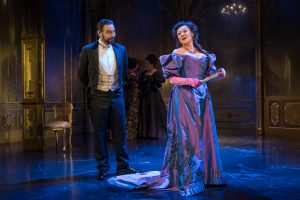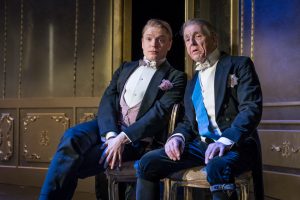The fifth show as part of the Vaudeville Theatre’s Oscar Wilde season, Carleigh Nicholls returns to examine this stylish production and how the father-relationship is intimately realised by a real-life pairing.
“One’s past is what one is. It is the only way by which people should be judged,” Lady Gertrude Chiltern recites to her husband, highlighting one of the key themes of An Ideal Husband: should a man be ruined for the sins of his youth? An Ideal Husband marks the fifth show in the Vaudeville Theatre’s Oscar Wilde season, and it is arguably one of Wilde’s best works. As such, expectations should be high, and director Jonathan Church’s adaptation does not disappoint.
Early in his career, the seemingly ideal Sir Robert Chiltern (Nathaniel Parker) sold a Cabinet secret for private profit. The conniving Mrs. Cheveley (Frances Barber) has proof of his indiscretion, and threatens his career and marriage should he not support a fraudulent Argentine canal scheme she has invested in. It is now up to the dandy and idle Lord Goring (Freddie Fox) to help his friend.

The play has wisely been kept in its period setting, and designer Simon Higlett has created an intricate yet simple set, with golden arches framing the stage. While this simple set works well for the majority of the play, the first Act begs for a more elaborate setting. In Act One, a party takes place at the Chiltern’s with the stage being left mostly empty, apart from the arches, with guests moving in and out of centre stage. Since the actors are very obviously moving into this invisible “frame,” it has a bit of a stilted and artificial feeling. However, the more confined spaces of the Chiltern’s morning room, and Lord Goring’s dressing room in later Acts are more aesthetic, since the actors seem to be more naturally habituated. Indeed, the Vaudeville Theatre works well for these more intimate scenes. Lord Goring’s room is draped in red curtains, cleverly depicting a nineteenth-century bachelor pad of sorts. The lighting is also quite effective, with it shifting towards blue tones in more intense scenes. Additionally, the costuming is well thought out— where the morally upright Lady Chiltern dresses in white, Mrs. Cheveley wears striking purple and red gowns, highlighting her bold and daring personality.
Wilde is the epitome of wit, and it can be a struggle for actors to make the lines sound natural without being too affectatious. While some of the minor actors struggle with this, the cast largely succeeds in bringing life to Wilde’s lines. The showstoppers of this production are real‑life father-and-son duo Freddie Fox as Lord Goring and Edward Fox as his father, Lord Caversham. They bring their familial chemistry on stage with them. Edward Fox masterfully portrays the curmudgeonly and long-suffering father to his lazy and frivolous son. When Edward Fox asked, “Do you always really understand what you say, sir?” The audience roared with laughter as his son dryly responded, “Yes, father, if I listen attentively.” Although he perhaps looks too youthful, Freddie Fox brings great maturity and depth to his Lord Goring. He portrays “the idlest man in London,” rather than the ideal man, but he is perhaps the most moral character of all. Fox is able to keep up with Wilde’s banter, while also showing deep emotional reserves. When he offers Lady Chiltern help, he shows true concern.

The rest of the main cast is also strong. Nathanial Parker portrays a likeable Sir Robert Chiltern: even when he gives his harsh speech to his wife, begging her to remove him from her pedestal, he injects enough heartbreak into the speech as to not be cruel. Additionally, Faith Omole is lively and cheerful as Miss Mabel Chiltern, and keeps up well with Freddie Fox’s quick banter. Likewise, Susan Hampshire brings some levity and comedy with her monologues as Lady Markby.
Frances Barber is perhaps an odd casting choice as Mrs. Cheveley. She is unbelievable as Lady Chiltern’s school age contemporary (Sally Bretton), and the large age difference between her and Freddie Fox’s Lord Goring does make one wonder when their affair was supposed to have taken place. However, Barber brings great energy to her role, and often steals the scene. She is menacing, and it is easy to believe that she would ruin Sir Robert’s life without any scruples. However, she lacks some charm, which makes it difficult to imagine Goring ever falling for her.
Sally Bretton does a lovely job in the often-thankless role of Lady Chiltern, who is not necessarily a fun character to play: she does not get the witty lines, nor is she part of the central love story. However, her arc is essential to the central themes of forgiveness and idealization, and Bretton brings great sincerity and feeling into her Lady Chiltern. Whilst she is self-important and somewhat judgemental, she is also willing to take advice and listen. Interestingly, this adaptation has cut out the controversial and often misinterpreted line “A man’s life is of more value than a woman’s.” Instead, Lady Chiltern echoes Lord Goring’s previous line that “We men and women are not made to accept such sacrifices from each other. We are not worthy of them.” Lady Chiltern learns that “No one should be entirely judged by their past.” Unfortunately for Wilde, society was not so willing to follow that lesson in his case.
An Ideal Husband is playing until 14th July 2018.














